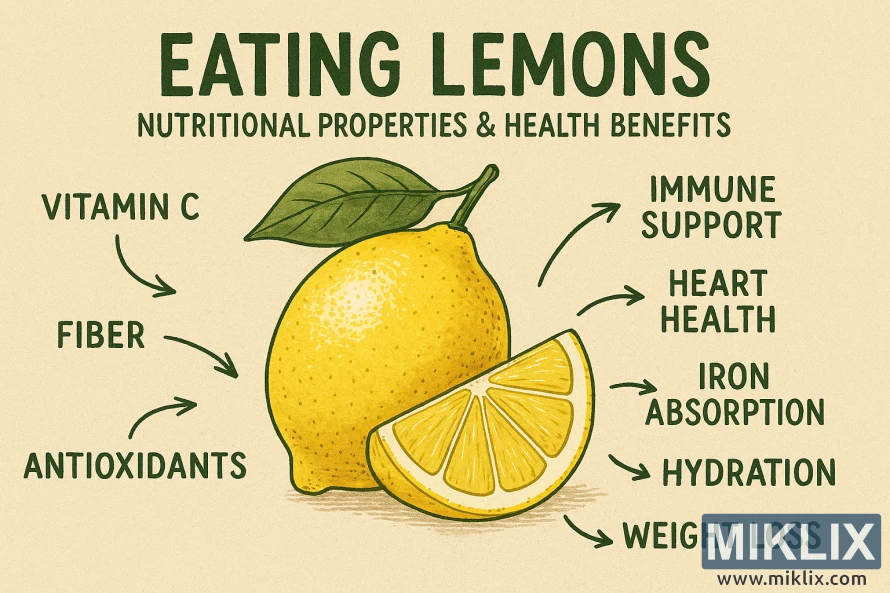From Detox to Digestion: The Amazing Health Benefits of Lemons
Published: April 4, 2025 at 4:53:16 PM UTC
Last updated: January 2, 2026 at 5:40:28 PM UTC
Lemons are small but mighty fruits packed with essential nutrients. They can significantly contribute to your well-being. Their vibrant flavor brightens up meals and offers health benefits. Rich in vitamin C, antioxidants, and plant compounds, lemon nutrition is remarkable. It positively impacts heart health, weight management, and digestion. Adding lemons to your daily routine can lead to a healthier lifestyle.

Key Takeaways
- Lemons are high in vitamin C and antioxidants.
- They support heart health and weight management.
- Lemons may reduce cancer risk and improve digestion.
- Incorporating lemons into your diet boosts overall well-being.
- Citrus health benefits include enhanced immunity and skin health.
The Nutritional Profile of Lemons
Lemons are full of important nutrients. They have a lot of vitamin C, with 30-53 mg in each fruit. This is more than half of what adults need every day. Vitamin C helps our immune system and makes collagen.
Lemons also have dietary fiber, mostly pectin, which is about 3 grams per lemon. This fiber helps with digestion and keeps our gut healthy. They also have small amounts of iron, calcium, potassium, and folate.
- Iron
- Calcium
- Potassium
- Folate
The vitamins in lemons work together to improve our health. They help our body absorb iron and boost our immune system. Eating lemons can make us healthier overall.
Support for Heart Health
Lemons are great for your heart. They have lots of vitamin C, which helps lower heart disease and stroke risks. Women who eat lemons often might see a 19% drop in stroke risk.
Lemons are more than just vitamin C. Their pith is full of fiber, which helps lower cholesterol. This can make your heart work better, showing lemons' big role in heart health.
Eating lemons every day can make your heart healthier. They're a top pick for anyone wanting to boost their heart health.
Weight Management with Lemons
Lemons are known for helping with weight loss. They contain a type of fiber called lemon pectin. This fiber can make you feel full by expanding in your stomach. A 2021 study showed that pectin can help with weight control.
Lemon juice is often praised, but it doesn't have much pectin. Most pectin is in the lemon peel and the white layer under the skin. Eating whole lemons, including the peel, is key to getting enough pectin.
Some people drink lemon water for hydration. But, there's not much proof it helps with weight loss. Lemon water can help you drink less sugary drinks. Yet, it's not enough on its own for weight management.
Using lemons in meals can help with weight control. Adding them to salads, dressings, or marinades boosts flavor and nutrition. This supports your overall health and helps with weight management.
Preventing Kidney Stones
Lemons play a big role in preventing kidney stones because of their citric acid. This acid makes you urinate more and makes the urine less acidic. Studies show that drinking one cup of lemon juice a day can lower the risk of stones for some people.
Adding lemons to your meals is easy and fun. It helps keep your kidneys healthy. Here are some ways lemons help:
- More urine means less chance of stone-forming substances.
- A higher urine pH stops crystals from sticking together, which is how stones form.
- Lemon juice's taste can make drinking water more enjoyable.
Even though lemons seem to help with kidney stones, we need more research to be sure. But, drinking enough water is always key to prevent kidney stones.

Protection Against Anemia
Lemons help fight anemia, mainly the iron deficiency type. They don't have much iron but boost vitamin C and iron absorption. Vitamin C in lemons helps the body absorb iron from plant sources better.
This makes lemons great for meals, helping those at risk of anemia. Adding lemons to your diet can bring many benefits, like:
- Spinach
- Lentils
- Tofu
- Beans
Combining these iron-rich foods with lemons improves vitamin C and iron absorption. This helps your body use iron more effectively, supporting your health.
Reducing Cancer Risk
Eating a diet full of fruits and vegetables, like lemons, might help lower cancer risk. Studies suggest that eating more citrus fruits could be linked to less lung cancer. Even though the proof is not solid, the possible benefits are worth looking into.
Lemons are packed with antioxidants, like flavonoids, which help protect cells. These compounds are key to keeping cells healthy. Scientists are studying how they might fight cancer.
Adding lemons to your meals can boost your health. They play a part in preventing cancer when eaten as part of a healthy diet. So, including citrus fruits like lemons in your meals could be a smart move for your health.
Improving Digestive Health
Lemons are great for your digestive health, thanks to their high fiber content. The fiber in lemons, like pectin, is soluble and good for your gut. It helps slow down sugar absorption and keeps blood sugar stable, which is key for digestion.
To get the most benefits, eat the whole lemon, not just the juice. Lemon juice doesn't have enough fiber, which reduces its digestive benefits. Adding whole lemons to your meals can boost digestion and help with digestive problems.
The Role of Lemons in Boosting Immunity
Lemons are great for boosting your immune system. They are packed with vitamin C, which is known to help fight off illnesses. Eating lemons regularly can make your body stronger against infections and shorten colds.
Also, lemons have flavonoids that help your immune system. These compounds fight off harmful free radicals. Adding lemons to your food can help keep your immune system strong.

Enhancing Skin Health with Lemons
Lemons are great for your skin. They have vitamin C, which helps make collagen. This keeps your skin elastic and young-looking. Using lemons can make your skin look vibrant and healthy.
Studies show that vitamin C helps fight skin damage from the environment. It also helps with acne, oily skin, and blackheads. Lemon juice's acidity cleanses the skin and reduces oil.
But, be careful with lemon juice on your skin because it's acidic. Always do a patch test first to avoid irritation. Also, use sunscreen after applying lemon juice to protect your skin from the sun.
Lowering Blood Pressure
Lemons are a natural way to lower blood pressure, when eaten as part of a balanced diet. Studies show that eating lemons regularly can help improve blood pressure. This is true, as long as you also exercise regularly. The heart benefits from lemons come from their citrus flavonoids.
Adding lemons to your meals can help manage blood pressure in several ways:
- Flavonoids improve heart function.
- Vitamin C boosts overall health.
- Drinking lemon water helps with blood flow.
If you want to keep your blood pressure healthy, try adding lemons to your drinks, salads, and meals. Making lemons a regular part of your diet can be tasty and good for your heart.
Hesperidin and Diabetes Risk Reduction
Hesperidin is a natural compound found in lemons. It helps manage blood sugar levels. This makes lemons a great choice for those with diabetes.
Studies show that hesperidin slows down the body's conversion of starch into sugar. This can help prevent blood sugar spikes. It's a great way to keep blood sugar levels stable.
Adding lemons to your meals and snacks can help keep blood sugar levels healthy. Here are some ways to enjoy lemons:
- Adding lemon juice to water for hydration and flavor.
- Using lemon zest in cooking to enhance meals naturally.
- Incorporating lemons in salad dressings for a zesty kick.
In summary, lemons can help manage blood sugar and lower diabetes risk. They are not only tasty but also good for your health.
The Culinary Uses of Lemons
Lemons are a versatile ingredient in the kitchen. They add a bright flavor to many dishes. This makes them a key part of cooking in many homes.
In savory dishes, lemon juice and zest add a refreshing touch. They brighten seafood and poultry. Lemons also make meats tender and flavorful when used in marinades.
For vegetables, a squeeze of lemon juice makes them fresh and vibrant. This encourages the creation of lively dishes.
In desserts, lemons are a star. They balance sweetness in treats like lemon bars and lemon meringue pie. The zest of lemons also adds a unique aroma to baked goods.
Lemon juice is also essential in dressings and sauces. It enriches flavors and adds depth. Drinks, from lemonade to cocktails, also benefit from lemons.
Discover the joy of cooking with lemons. See how this citrus fruit can take your dishes to the next level!
Antibacterial Properties of Lemon Juice
Lemon juice is famous for its strong antibacterial effects. It's great for cooking and cleaning. The citric acid in lemon juice fights off many pathogens, like salmonella and staphylococcus. Its high acidity makes it hard for harmful germs to survive.
Using lemon juice for cleaning shows its power as a natural disinfectant. It not only adds flavor to your food but also keeps your kitchen clean. Adding lemon juice to your cleaning routine can help keep germs away.

Potential Risks of Consuming Lemons
Lemons are good for us, but too much can be bad. Their high acidity can harm teeth, making them sensitive and prone to decay. This is a big lemons risk for some people.
Those with GERD might see their symptoms get worse. The acidity can make acid reflux worse. People with sensitive stomachs might feel stomach pain or discomfort from lemons.
Some people might have an allergic reaction to lemons, known as citrus allergies. Symptoms can range from skin rashes to breathing problems or stomach issues. Even migraines can happen in some after eating lemon products.
It's important to eat lemons in moderation. Knowing how much you can handle can help avoid the bad effects. This way, you can enjoy their benefits without the risks.
Various Forms of Lemon Consumption
Lemons come in many forms, each adding flavor and nutrition to our meals. You can use them whole, juiced, zested, or preserved. Each way brings its own health benefits.
Whole lemons are great for fiber, which is often lacking in lemon juice. This fiber helps with digestion, adding to your health. Lemon juice, on the other hand, is perfect for cooking and drinks. It makes water or cocktails refreshing and is great for marinating meats.
Lemon zest, the colorful outer skin, adds a lot of flavor. It makes both sweet and savory dishes better, encouraging creativity in cooking. Preserved lemons, a key ingredient in Mediterranean dishes, bring a strong flavor. They show another way to enjoy lemons.
Adding lemons to your meals can be fun and healthy. Whether you like lemon juice or whole lemons, exploring these citrus fruits is a culinary adventure.
Conclusion
Adding lemons to your diet can bring many health benefits. They are packed with vitamin C, which is good for your heart and immune system. Lemons also have soluble fiber, which helps with weight control by keeping you full.
Their citric acid can prevent kidney stones and boost digestive health. Lemons are full of antioxidants, which may lower the risk of heart disease and some cancers. They are easy to use in cooking, making them a great addition to any meal.
Using lemons daily can greatly improve your health and energy. They help prevent iron deficiency and support heart health. These citrus fruits are not only tasty but also very good for you, making them key to long-term wellness.

Further Reading
If you enjoyed this post, you may also like these suggestions:
- Brown Rice, Bold Benefits: Why This Whole Grain Deserves a Spot on Your Plate
- The Flaxseed Fix: Unlocking Big Health Gains from a Small Superfood
- CLA Supplements: Unlocking the Fat-Burning Power of Healthy Fats
